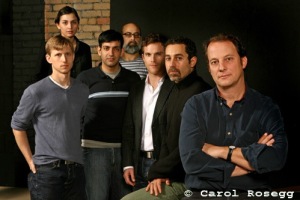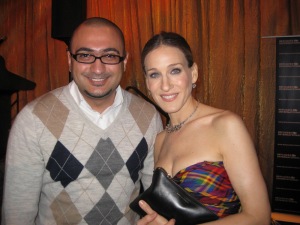Haider Hamza is an Iraqi who goes around the US, with a small wooden booth titled “Talk to an Iraqi”, and he just sits there and lets people come and talk to him.
Iraqi Refugees
Seeing Our Past in ‘Betrayed’
 It was the same scene playing in my mind as it was on the stage. A young man called Adnan standing between mutilated dead bodies at the Baghdad morgue, looking for his friend’s body. As I was watching, I recalled how I stood in the real morgue back in 2006. The smell of the decaying bodies and the horror of being identified by the militias who were controlling the morgue flashed back into my eyes. I couldn’t but feel the warm tears pouring, watering my cheeks. The whole scene reminded me of the story I covered for the Washington Post when Shiite militiamen killed hundreds of innocents after the Samarra shrine bombing in 2006, an incident that triggered the civil war between the Sunnis and Shiites in the war-torn country.
It was the same scene playing in my mind as it was on the stage. A young man called Adnan standing between mutilated dead bodies at the Baghdad morgue, looking for his friend’s body. As I was watching, I recalled how I stood in the real morgue back in 2006. The smell of the decaying bodies and the horror of being identified by the militias who were controlling the morgue flashed back into my eyes. I couldn’t but feel the warm tears pouring, watering my cheeks. The whole scene reminded me of the story I covered for the Washington Post when Shiite militiamen killed hundreds of innocents after the Samarra shrine bombing in 2006, an incident that triggered the civil war between the Sunnis and Shiites in the war-torn country. The play was great. The New York Times put it in the best words:
“But the clarity of the writing, the urgency of the story being told and the fine performances give the play a sharp dramatic impact and a plain-spoken beauty. Painful human experience is presented here as just that. Nothing else is necessary to awaken sympathy, despair and awareness of a grave moral failure on the part of the American government.”
 Last night was great not only because I watched the play, but also because I had the chance to meet George Paker whom I consider my idol, along with Anthony Shadid. I never want anything in my career life just to achieve at least half of what they achieved. Mr. Paker was a very nice person. We talked about the article, the play and of course his book The Assassins Gate.
Last night was great not only because I watched the play, but also because I had the chance to meet George Paker whom I consider my idol, along with Anthony Shadid. I never want anything in my career life just to achieve at least half of what they achieved. Mr. Paker was a very nice person. We talked about the article, the play and of course his book The Assassins Gate.
Before the play started, my Iraqi friends and I had the chance to speak with celebrity and American actress Sarah Jesscia Parker who was hosting the play along with Matt Dillon, and Refugees International. We had the chance to speak with Sarah Jessica about how we lived and worked for American organizations, be it for the government or for the U.S. newspapers. My friend, B, whom the play was partly based on her story as a young woman working in the Green Zone for the Americans, explained to the superstar the reality of the daily risk she put herself in to do her job. Parker was all ears. It was the second time she attended the play. She said she was ready this time. She brought her tissues.
Welcoming Iraqi Refugees in the City of Brotherly Love
blog.bassamsebti@gmail.com